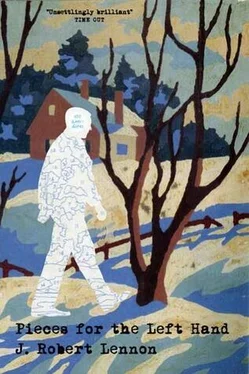However, the intensity of her study had caused her, unconsciously, to apply her theory to all words, even (and perhaps especially) those she encountered outside the realm of literature: indeed, road signs, personal conversations, song lyrics and even her own thoughts were fair game. The world swelled with meaning, and the more meaning she identified, the more she became convinced existed outside her immediate perception. Soon she had come to believe in plots against her and the presence of otherworldly interlopers in her life, and she checked in to a mental hospital for treatment. After six months, armed with a sack full of pharmaceuticals, she moved in with her sister on a farm outside our town, where she remained for nine years. Only recently has she felt confident enough to take a job downtown, and to re-enter the bustling society she is naturally drawn to.
She lives in a halfway house and relies on government subsidies to fill her prescriptions. She has given up books, music and television and taken up gourmet cooking. The world, she tells me, her eyes filled with the crazed conviction of the recently converted, is meaningless.
I see her often now, though I am neither surprised nor offended on those occasions when, unable or unwilling to admit my existence, she passes me by without saying hello.
Our friend, the former historian, brings us this story, from the eastern European nation-state that was his area of expertise. A small city there, he tells us, was terribly besieged in the last war, and when the war was over a young man began to build a bomb shelter beneath what was left of his home. When, years later, the rest of the city was enjoying a renaissance, with great gains in public health, commerce and the arts, the man expanded and strengthened his shelter, and stocked it with all manner of food, weapons and books. Our friend met the man at this time, and asked why he looked inward when everyone else was expanding the horizons of their lives. The young man replied that he believed the current peace was unstable, and that civil unrest would soon visit their small nation.
Gradually the young man withdrew from society, and grew old. His neighbors came to regard him as mad, and as those who knew him died and new people moved to the city, his isolation became total. He was rarely seen, and when he was, adults tended to whisper to one another and children to run in fear.
But it happened that the man was right. Civil conflict did break out, and the city was mercilessly bombed for more than two months. When an uneasy peace was finally achieved, survivors visited the old man’s home to request his assistance in the reconstruction effort. His house had been destroyed, but the heavy door of the shelter still stood, and they knocked loudly on it and called the man’s name. The old man made no reply.
Our friend’s contacts in the region described to him what happened next. The survivors, believing that the old man was ill, or perhaps that he was greedily hoarding his much-needed provisions, dug away the earth around the door, until at last they were able to pull the doorframe from the foundation. They were surprised to find that the old man was dead. He had shot himself. The shelter, on the other hand, was much as many had imagined. It was set up as a comfortable study. The walls were lined with books, and a huge store of canned food had been stockpiled beside a makeshift kitchen. The dead man sat in an upholstered armchair, a book by Tolstoy open on his lap, and the rotted remains of what must once have been a delicious meal arranged on a small table by his right elbow. A revolver lay on the floor at his feet.
There was some discussion of why the old man would have killed himself, having been so well prepared for a tragedy that had taken most citizens by surprise, but such talk quickly gave way to the work of raiding his pantry. Almost as an afterthought, the townspeople also took some of the densest-looking books, for it was spring and the branches of trees were too green and supple to be used as kindling.
Whether due to some degree of personal recklessness or simply to the vagaries of fortune, our friend frequently found himself in situations that brought financial ruin, emotional distress and physical injury. For some years these recurrent problems prevented him from achieving his life’s goals; indeed, they left him unsure even of what those goals might be. Then, fed up at last, he returned to college to study an obscure and byzantine science he had picked almost at random, immersing himself completely in his research and quickly establishing himself among his advisors as a formidable and unusual intellect. He co-authored several influential papers with his teachers, won many honors, and was fully expected to emerge from school at the very top of his field.
For some years, however, our friend struggled to complete his doctoral dissertation. His achievements were more than sufficient to serve as the basis for an excellent paper, but he wanted to crack a particularly knotty problem that had so far eluded his superiors, and thus make the dissertation worthy not only of his degree, but perhaps even of commercial publication and international recognition.
Then, one night, in a burst of inspiration, our friend solved the crucial problem. He jotted the solution down on a few scraps of paper, worked it out in detail on his laptop computer, then left his apartment at a dead sprint to wake his colleagues at the lab.
At this moment, however, his bad luck returned, and he was assaulted by armed thugs, who stole his computer and wallet and beat him unconscious. When he recovered from his injuries, he discovered that the weeks leading up to his inspiration had been erased from his memory by the trauma, never to be restored. Worse yet, his computer was never found, and the notes he had taken in the middle of the night made no sense to him whatsoever.
When he was released from the hospital, he returned to work, assuming that if he continued his research in the same vein that he remembered conducting it, he would again hit upon the big idea. But two years later, the solution still had not come to him. It seemed that it was not in the nature of epiphanies to be repeated. This realization so discouraged our friend that he gave up on his field entirely. Today he drives a taxi in a large Midwestern city, and keeps the cryptic notes taped to his dashboard, in the hope that their meaning will become clear again.
He is occasionally asked by his passengers about the notes. Upon hearing his story, most tell him that he shouldn’t have gone out alone after dark. Our friend takes a perverse pleasure, he tells us, in dropping these people off at an inconvenient place, such as over a steaming subway grate or directly in front of a street vendor.
Tired by a long country drive, we stopped at a roadside tavern for a drink and something to eat. The tavern filled the first floor of a two-story brick building, and in the parking lot stood an illuminated board which read APARTMENT AVAILABLE LIVE ROCK NIGHTLY.
While eating we engaged the bartender in conversation, and discovered that he was the owner of the establishment. Emboldened by the food and drink, we brought up the reader board, suggesting that he might rent his apartment more quickly were he to remove the reference to live rock music.
The owner nodded sadly, and confessed to us that his teenage daughter had lived in the apartment once, but some years ago had died in a drunk driving accident, the result of an evening spent in another bar a few miles down the road. The owner, his eyes brimming with tears, said that he blamed himself for the accident, as he had refused to serve his daughter in his own bar, where she had been employed illegally as a cocktail waitress. With her gone, he had had to hire a legitimate waitress, and as a result the tavern was no longer profitable and had begun to lose money. Renting the apartment would make his business solvent, but he still hadn’t gotten around to cleaning it out, and in fact did not want to face the task. At the same time, actively not renting the apartment was financially unjustifiable. The sign, he explained, was a compromise between his business and emotional needs. It had stood unchanged for two years, even though the band had broken up and live music was no longer played here. The owner admitted that the place was about to go up for sale.
Читать дальше










